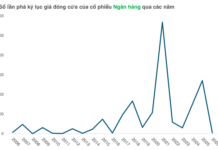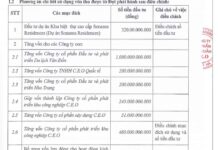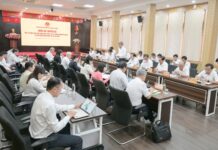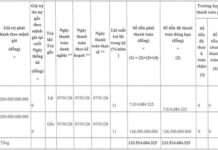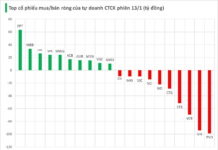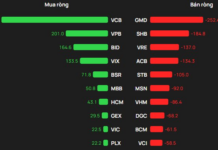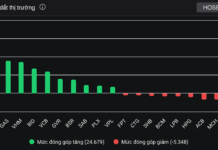At the workshop “Perfecting Land Law to Create Development Momentum in the Digital Age” organized by VietTimes Electronic Magazine, Mr. Nguyen Bao Trung, Deputy Director of the Department of Digital Transformation and Information Data of Natural Resources and Environment (MARD), shared his thoughts on the concerns regarding the digitization of land data while many land plots remain without red books.
Mr. Nguyen Bao Trung affirmed that the red book is not an obstacle. It is just a type of legal document. Instead of waiting for all red books to be digitized, MARD is proactively building a database from the land’s origin.
“Building a land database is not entirely dependent on whether there is a red book or not. The red book is a legal factor, and the state will proactively issue the book to the people,” emphasized Mr. Trung.

Mr. Nguyen Bao Trung, Deputy Director of the Department of Digital Transformation and Information Data of Natural Resources and Environment (MARD), shared at the workshop.
According to Mr. Trung, MARD is currently implementing a policy where people who do not meet the conditions for a certificate can still register their land information. Registered dossiers will be stored and processed, and when the legal conditions are met, the state will issue the land certificate. This approach helps to remove bottlenecks and accelerate the digitization and land management process more efficiently while ensuring the rights of the people.
Regarding digital transformation in the land sector and how it reduces administrative procedures for people and enterprises, Mr. Nguyen Bao Trung said that the construction of the land database is being carried out nationwide.
According to current regulations, the construction of the land database is under the authority of local authorities. According to Mr. Trung, currently, about 495/699 districts (before the merger) have implemented the construction of the land database. Statistical and inventory data bases exist in many localities; however, the construction of a land price database is still limited, with only about 50 districts (before the merger) having this content.
Explaining the limited construction of the land price database, Mr. Trung said that the reason is not technical or technological difficulties but input information issues.
“What market land price should be used as input now? This is a confusing story,” Mr. Trung emphasized.
According to Mr. Trung, obtaining the correct transaction price as input is challenging because state agencies cannot access the actual transaction prices from people and real estate businesses. This poses a challenge for building a land price database.
Mr. Trung also said that the construction of the land database would be extended until 2026 to complete it nationwide. The reason is that the resources of the localities for this content are not yet as expected. Also, according to Mr. Trung, the central government will support those localities that are still facing difficulties.
Regarding reducing administrative procedures for people and businesses, Mr. Trung said that based on the construction of the land database, the necessary papers and dossiers would be determined and reduced. With the information and data that the state has, people will not have to submit those papers.
“The issue is to ensure the legality of the data. When the legality of the data is ensured, many administrative procedures can be reduced,” said Mr. Trung.
Mr. Trung also emphasized that in the next phase, the Department of Digital Transformation and Information Data of Natural Resources and Environment will coordinate with the Land Administration Department of MARD to reform and simplify administrative procedures. Procedures that do not originate from the people’s needs will be proactively updated by the state agencies.
To further improve the construction of the land database in the future, Mr. Trung hopes that state agencies will be able to access the real estate price databases of real estate associations that are being traded to build a database for land.
MobiFone Appoints New Deputy General Director, Born in 1989
On August 19, 2025, Mobifone Telecommunications Corporation held a ceremony to announce the decision on personnel matters. According to Decision 58/QD-HDTV dated August 19, Mr. Tran Duc Thanh, born in 1989, Chairman of the Board of Directors of Mobifone Digital Solutions JSC, was appointed as the new Deputy General Director of Mobifone Telecommunications Corporation.
Unlocking Innovation: Propelling Data Exploitation as the Epicenter of Economic Prosperity
On August 18th, at the Hoa Lac High-Tech Park in Hanoi, a momentous occasion took place with the attendance of Pham Minh Chinh, a member of the Politburo and the Prime Minister of Vietnam. The event marked the official launch of the National Data Center No.1 and the inauguration of the National Database System hosted within the center. This significant development in Vietnam’s technological landscape was organized by the Ministry of Public Security.
The Data Center of the Nation: Unlocking the Age of Enlightenment
As Prime Minister Pham Minh Chinh dubbed the National Data Center the “heart of the country’s digital transformation”, he hit the nail on the head.






